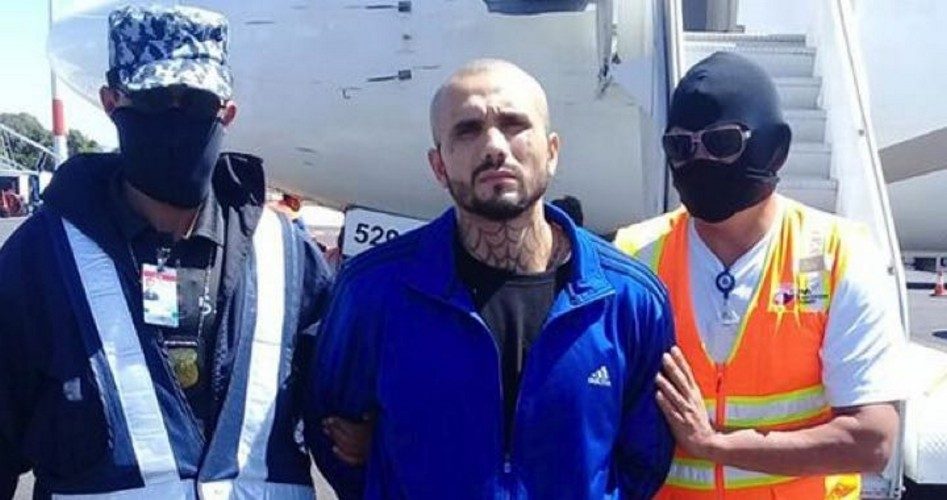
During a White House meeting on February 22 to discuss school safety with local and state officials, President Trump complained about the lack of cooperation the federal government was receiving from California in apprehending illegal aliens who gravitated to violent gangs such as MS-13. He was apparently so frustrated by California officials that he said he was thinking of pulling Immigration and Customs Enforcement (ICE) agents out of the state. The president told those at the meeting:
We’re getting no help from the state of California. I mean, frankly, if I wanted to pull our people from California, you would have a crying mess like you’ve never seen in California. All I’d have to do is say, ICE and Border Patrol, let California alone. You’d be inundated — you would see crime like nobody has ever seen crime in this country. And yet we get no help from the state of California. They are doing a lousy management job. They have the highest taxes in the nation, and they don’t know what’s happening out there. Frankly, it’s a disgrace — the sanctuary city situation, the protection of these horrible criminals — you know because you’re working on it. And the protection of these horrible criminals in California, and other places, but in California. That if we ever pulled our ICE out and we ever said, “Hey, let California alone. Let them figure it out for themselves,” in two months they’d be begging for us to come back. They would be begging. And you know what? I’m thinking about doing it.
It is difficult for anyone to say at this point how serious the president might be in following through on his threat. His statement did contradict what ICE Acting Director Tom Homan said in a news release last October, in response to Governor Jerry Brown’s signing of the California Values Act into law on October 5, prohibiting state and local agencies from enforcing immigration laws or from working with immigration enforcement agencies. The law effectively made California a “sanctuary state.”
{modulepos inner_text_ad}
Homan began his statement strongly, noting, “Governor Jerry Brown’s decision to sign SB54 and make California a sanctuary state for illegal aliens — including those who have committed crimes — will undermine public safety and hinder ICE from performing its federally mandated mission. The governor is simply wrong when he claims otherwise.”
Homan continued, “SB54 will negatively impact ICE operations in California by nearly eliminating all cooperation and communication with our law enforcement partners in the state.”
Perhaps the part of Homan’s statement that received the most attention in the media, however, was: “ICE will have no choice but to conduct at-large arrests in local neighborhoods and at worksites, which will inevitably result in additional collateral arrests, instead of focusing on arrests at jails and prisons where transfers are safer for ICE officers and the community. ICE will also likely have to detain individuals arrested in California in detention facilities outside of the state, far from any family they may have in California.”
SB 54 went into effect on January 1, and just 17 days later, California Attorney General Xavier Becerra threatened to fine employers, public or private, who voluntarily give information on employees, concerning their legal status to be in the country, to federal immigration agents. “We will prosecute those who violate the law,” promised Becerra.
Becerra was responding to remarks made by Homan to Fox News earlier in the month, in which he said a crackdown on illegal immigration in the Golden State was on its way. “California better hold on tight,” Homan warned. “If the politicians in California don’t want to protect their communities, then ICE will.”
Of course, ICE would not be able to take any action in California if Trump decides to pull ICE out of the state. That course of action would create many more problems than it would solve, so it is difficult to imagine the president actually taking that extreme action. It is more likely that the Justice Department will increase its efforts to enforce 8 U.S.C. 1373 — “Communication between government agencies and the Immigration and Naturalization Service.”
The first paragraph of the law reads:
Notwithstanding any other provision of Federal, State, or local law, a Federal, State, or local government entity or official may not prohibit, or in any way restrict, any government entity or official from sending to, or receiving from, the Immigration and Naturalization Service information regarding the citizenship or immigration status, lawful or unlawful, of any individual.
A major handicap to such enforcement, however, has been repeated rulings made by federal district judges, barring the administration from enforcing the law by using such measures as cutting off federal funding. For example, on April 25, 2017, U.S. District Judge William Orrick III of the U.S. District Court for the Northern District of California blocked the Trump administration’s Executive Order 13768 — to withhold funding from sanctuary cities that limit cooperation with U.S. Immigration and Customs Enforcement authorities. Other federal judges, including Judge Derrick Watson of Federal District Court in Honolulu granted similar restraining orders enjoining the Trump administration from enforcing or implementing sections of Trump’s executive order stating that “sanctuary jurisdictions” that refuse to comply with immigration enforcement measures will not be “eligible to receive Federal grants, except as deemed necessary for law enforcement purposes.”
Trump wasted little time before speaking out against Watson’s ruling. He declared that the court was motivated by “political reasons.” “We are going to fight this terrible rule,” the president said. “We are going to take our case as far as it needs to go, including all the way up to the Supreme Court. We are going to win. We are going to keep our citizens safe and regardless, we are going to keep our citizens safe, believe me.”
This dispute between the administration and “sanctuary” jurisdictions will ultimately be settled by the Supreme Court.
Photo of MS-13 member being deported: Screenshot from ICE.gov
Related articles:
California to Punish Businesses That Cooperate With Feds on Immigration
Governor Brown Signs Bill to Make California a Sanctuary State
ICE Acting Director: California Sanctuary State Law Will Force “At-large” Arrests
Trump DOJ Demands Documents From “Sanctuary” Jurisdictions
Sessions and DOJ Give Sanctuary Cities “Last Chance” to Comply
Trump, Sessions Increase Pressure on Sanctuary Cities
Sanctuary Cities: an Invitation for Criminals
ICE Acting Director: California Sanctuary State Law Will Force “At-large” Arrests
Governor Brown Signs Bill to Make California a Sanctuary State
California Advances Bills to Become Sanctuary State
Miami-Dade Ends Sanctuary City Policies and Gains Federal Funding
California Sues DOJ Over Sanctuary City Policy
Judge: DOJ Can’t Withhold Money From Sanctuary Cities
Denver Becomes the Latest “Sanctuary City”
Texas: Gov. Abbott Bans Funds for Sanctuary Cities; Senate Bill to Demand Compliance with ICE
Judge Blocks “Sanctuary Cities” Defunding Order; Trump May Take Case to Supreme Court
Seattle Files Suit Against Trump Admin. to Preserve Sanctuary City Status
San Francisco Sues Trump to Stop Executive Order About Sanctuary Cities
California Advances Bills to Become Sanctuary State
Illegal Alien Sues San Francisco for Violating Sanctuary City Law



